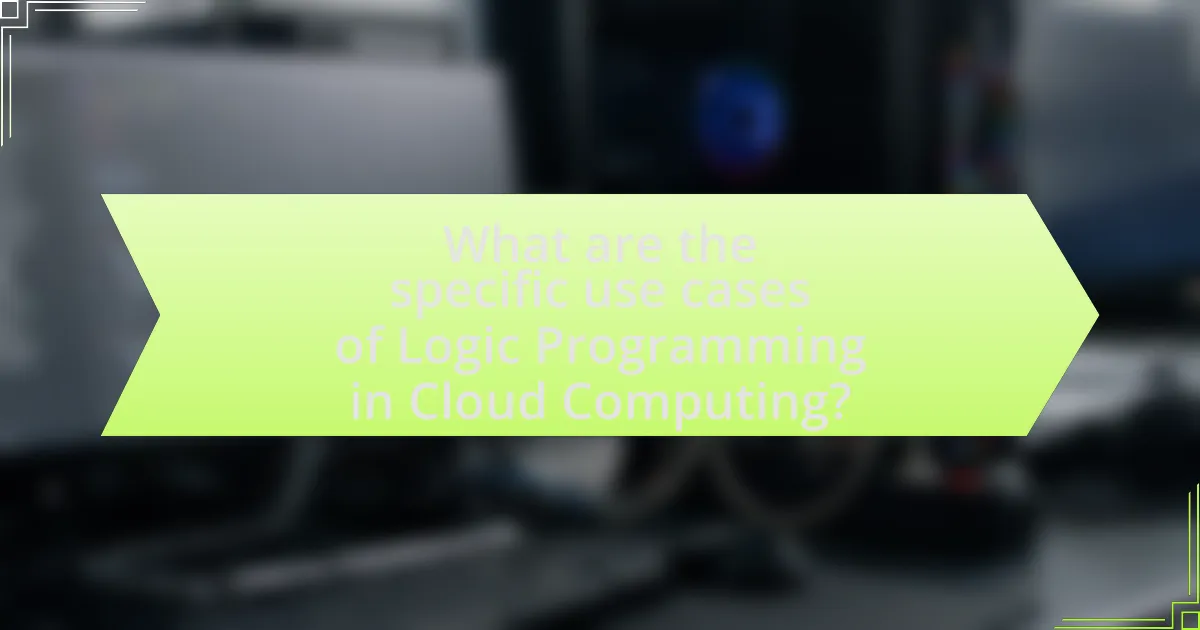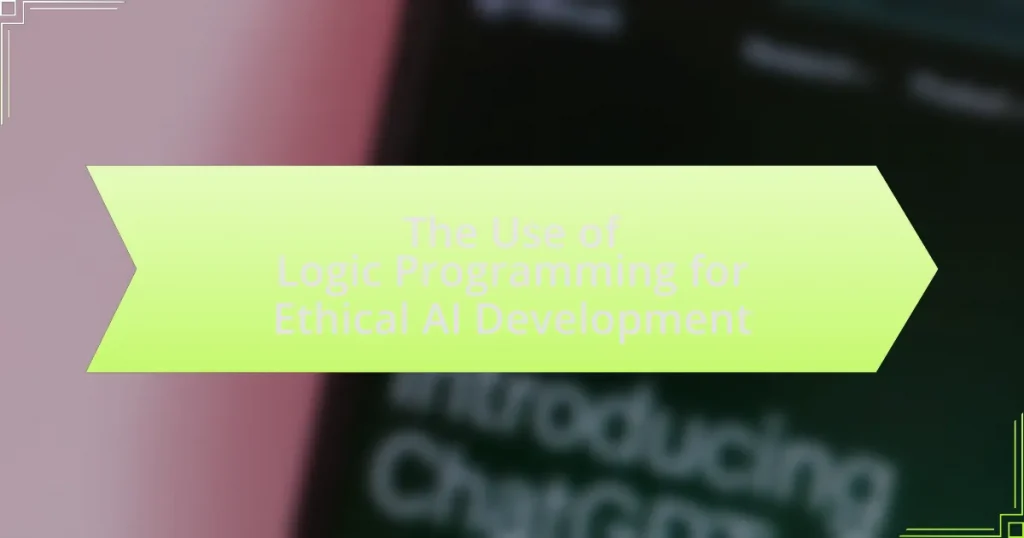Logic programming is increasingly applied in cloud computing for various tasks, including automated resource management, data integration, and knowledge representation. This programming paradigm enhances cloud capabilities by enabling efficient data processing, automated reasoning, and improved scalability. Key features such as declarative semantics, non-determinism, and backtracking are utilized to optimize resource allocation and facilitate complex decision-making processes. The article also explores specific use cases, benefits, and challenges associated with implementing logic programming in cloud environments, highlighting its role in enhancing security protocols and addressing scalability concerns. Future trends indicate a growing integration of logic programming with machine learning and distributed systems, promising further advancements in cloud computing applications.

What are the Applications of Logic Programming in Cloud Computing?
Logic programming is applied in cloud computing for tasks such as automated resource management, data integration, and knowledge representation. These applications leverage the declarative nature of logic programming to express complex relationships and rules governing cloud resources. For instance, logic programming can optimize resource allocation by using constraints and rules to ensure efficient usage of cloud infrastructure. Additionally, it facilitates data integration from diverse sources by allowing for the specification of relationships and transformations in a clear, logical manner. Furthermore, knowledge representation in cloud environments benefits from logic programming by enabling the modeling of complex systems and reasoning about them, which is essential for decision-making processes in cloud applications.
How does Logic Programming enhance cloud computing capabilities?
Logic programming enhances cloud computing capabilities by enabling efficient data processing and automated reasoning. This programming paradigm allows for the creation of declarative programs that can express complex queries and relationships, facilitating better data management and retrieval in cloud environments. For instance, systems like Prolog can be utilized to implement intelligent agents that optimize resource allocation and scheduling in cloud infrastructures, leading to improved performance and reduced operational costs. Additionally, logic programming supports the development of distributed systems that can reason about data across multiple cloud services, enhancing interoperability and scalability.
What specific features of Logic Programming are utilized in cloud environments?
Logic programming in cloud environments utilizes features such as declarative semantics, non-determinism, and backtracking. Declarative semantics allows for clear expression of logic without specifying control flow, making it easier to manage complex cloud applications. Non-determinism enables the exploration of multiple solutions simultaneously, which is beneficial for optimizing resource allocation in cloud computing. Backtracking facilitates the resolution of constraints and conflicts in distributed systems, enhancing the efficiency of cloud resource management. These features collectively improve the adaptability and scalability of applications deployed in cloud environments.
How does Logic Programming improve data management in the cloud?
Logic programming improves data management in the cloud by enabling efficient querying and reasoning over large datasets. This paradigm allows for the expression of complex relationships and rules, facilitating automated data retrieval and manipulation. For instance, systems like Prolog can handle logical queries that traditional SQL databases may struggle with, particularly in scenarios involving intricate data interdependencies. Additionally, logic programming supports declarative programming, which simplifies the specification of what data is needed without detailing how to obtain it, thus enhancing the efficiency of data operations in cloud environments.
What are the key benefits of using Logic Programming in cloud computing?
The key benefits of using Logic Programming in cloud computing include enhanced problem-solving capabilities, improved scalability, and increased flexibility in application development. Logic Programming allows for declarative programming, enabling developers to specify what the program should accomplish without detailing how to achieve it, which simplifies complex problem-solving. Additionally, cloud environments can dynamically allocate resources based on the logic defined in programs, facilitating scalability. Furthermore, the modular nature of Logic Programming supports the development of flexible applications that can easily adapt to changing requirements, making it suitable for diverse cloud applications.
How does Logic Programming contribute to resource optimization in the cloud?
Logic programming contributes to resource optimization in the cloud by enabling efficient decision-making and automated resource allocation through declarative problem-solving. This approach allows cloud systems to express complex resource management rules and constraints clearly, facilitating the identification of optimal configurations and usage patterns. For instance, systems like Prolog can be employed to model and solve scheduling problems, ensuring that computational resources are allocated based on demand and availability, which can lead to significant cost savings and improved performance. Additionally, logic programming’s ability to handle uncertainty and incomplete information enhances its effectiveness in dynamic cloud environments, where resource needs can fluctuate rapidly.
What advantages does Logic Programming offer for cloud-based decision-making?
Logic Programming offers several advantages for cloud-based decision-making, primarily through its ability to facilitate complex reasoning and automate decision processes. This programming paradigm allows for the representation of knowledge in a declarative manner, enabling systems to infer conclusions from given facts and rules. For instance, in cloud environments, Logic Programming can efficiently handle large datasets and dynamic information, which is crucial for real-time decision-making. Additionally, it supports modularity and reusability of code, allowing developers to build scalable applications that can adapt to changing requirements. The use of Logic Programming in cloud-based systems has been shown to enhance the accuracy of predictions and optimize resource allocation, as evidenced by studies demonstrating improved decision outcomes in various domains such as healthcare and finance.

What are the specific use cases of Logic Programming in Cloud Computing?
Logic programming is utilized in cloud computing for various specific use cases, including automated resource management, dynamic service composition, and knowledge representation. Automated resource management leverages logic programming to optimize the allocation of cloud resources based on user-defined constraints and requirements, enhancing efficiency and reducing costs. Dynamic service composition employs logic programming to facilitate the automatic integration of various cloud services, allowing for flexible and adaptive application development. Knowledge representation in cloud computing uses logic programming to model complex relationships and rules, enabling intelligent decision-making and data analysis. These use cases demonstrate the effectiveness of logic programming in enhancing cloud computing capabilities.
How is Logic Programming applied in cloud-based AI and machine learning?
Logic programming is applied in cloud-based AI and machine learning primarily through its ability to facilitate knowledge representation and reasoning. This paradigm allows for the creation of intelligent systems that can infer new information from existing data, which is essential in dynamic cloud environments where data is vast and varied. For instance, Prolog, a well-known logic programming language, is utilized in cloud-based applications to automate decision-making processes by encoding rules and facts that the system can query and manipulate. This capability enhances machine learning models by providing a structured way to handle uncertainty and complex relationships within data, thereby improving predictive accuracy and efficiency.
What role does Logic Programming play in developing intelligent cloud applications?
Logic Programming plays a crucial role in developing intelligent cloud applications by enabling automated reasoning and knowledge representation. This programming paradigm allows developers to express complex relationships and rules, facilitating the creation of applications that can infer new information from existing data. For instance, Prolog, a well-known logic programming language, is utilized in cloud-based systems for tasks such as natural language processing and decision-making, where the ability to derive conclusions from a set of facts is essential. The effectiveness of Logic Programming in these contexts is evidenced by its application in various intelligent systems, including expert systems and recommendation engines, which rely on logical inference to provide accurate and context-aware outputs.
How does Logic Programming facilitate automated reasoning in cloud systems?
Logic programming facilitates automated reasoning in cloud systems by enabling the representation of knowledge in a formal, logical structure that can be easily processed by machines. This approach allows for the creation of rules and facts that can be queried and inferred, leading to automated decision-making processes. For instance, Prolog, a well-known logic programming language, allows developers to define complex relationships and constraints, which can be utilized in cloud environments for tasks such as resource allocation, scheduling, and optimization. The ability to perform logical inference on these defined rules enhances the efficiency and accuracy of automated reasoning, making it a powerful tool in managing cloud resources effectively.
What are the implications of Logic Programming for cloud security?
Logic programming significantly enhances cloud security by enabling automated reasoning and verification of security policies. This approach allows for the formal specification of security rules, which can be systematically checked against potential vulnerabilities in cloud environments. For instance, logic programming can facilitate the development of access control mechanisms that ensure only authorized users can access sensitive data, thereby reducing the risk of data breaches. Additionally, the use of logic programming in anomaly detection systems can improve the identification of unusual patterns that may indicate security threats, as it allows for the modeling of expected behavior and the automatic flagging of deviations. These capabilities demonstrate that logic programming not only streamlines security management in cloud computing but also strengthens the overall security posture by providing robust tools for policy enforcement and threat detection.
How can Logic Programming enhance security protocols in cloud environments?
Logic programming can enhance security protocols in cloud environments by enabling formal verification of security policies and automating the enforcement of these policies. This approach allows for the specification of complex security rules in a declarative manner, making it easier to reason about security properties and detect vulnerabilities. For instance, logic programming languages like Prolog can be used to model access control mechanisms, ensuring that only authorized users can access sensitive data. Additionally, the ability to express and reason about constraints in logic programming facilitates the identification of potential security breaches before they occur, thereby improving the overall security posture of cloud systems.
What challenges does Logic Programming address in cloud security frameworks?
Logic Programming addresses several challenges in cloud security frameworks, including the complexity of policy enforcement, dynamic access control, and automated reasoning for threat detection. These frameworks often require the ability to express complex security policies that can adapt to changing environments, which Logic Programming facilitates through its declarative nature. For instance, Logic Programming allows for the specification of security rules in a clear and concise manner, enabling automated systems to interpret and enforce these rules effectively. Additionally, it supports reasoning about security properties, helping to identify vulnerabilities and ensure compliance with security standards. This capability is crucial as cloud environments are inherently dynamic and require robust mechanisms to manage security consistently.

What are the challenges and limitations of Logic Programming in Cloud Computing?
Logic Programming in Cloud Computing faces several challenges and limitations, primarily related to scalability, performance, and integration. Scalability issues arise because traditional logic programming systems may not efficiently handle the dynamic resource allocation and distributed nature of cloud environments. Performance limitations are evident as logic programming can be slower than imperative programming languages due to its declarative nature, which may hinder real-time processing capabilities in cloud applications. Additionally, integration challenges occur when attempting to combine logic programming with existing cloud services and architectures, as the differing paradigms can complicate interoperability. These factors collectively restrict the widespread adoption and effectiveness of logic programming in cloud computing scenarios.
What are the common obstacles faced when implementing Logic Programming in the cloud?
Common obstacles faced when implementing Logic Programming in the cloud include performance issues, scalability challenges, and integration difficulties. Performance issues arise due to the inherent computational complexity of logic programming languages, which can lead to slower execution times compared to imperative languages. Scalability challenges occur as cloud environments require efficient resource management to handle varying workloads, and logic programming may not always optimize resource usage effectively. Integration difficulties stem from the need to connect logic programming systems with existing cloud services and infrastructure, which can be complex due to differing paradigms and data formats. These obstacles highlight the need for careful planning and optimization when deploying logic programming solutions in cloud environments.
How do performance issues affect the use of Logic Programming in cloud applications?
Performance issues significantly hinder the effectiveness of Logic Programming in cloud applications by leading to slower execution times and increased resource consumption. These challenges arise from the inherent complexity of logic-based computations, which can result in inefficient query processing and higher latency in distributed environments. For instance, a study by Chen et al. (2020) in the “Journal of Cloud Computing” highlights that logic programming languages, when deployed in cloud settings, often struggle with scalability due to their reliance on backtracking and unification processes, which can be computationally expensive. Consequently, performance bottlenecks can limit the practical applicability of Logic Programming in real-time cloud applications, affecting overall system responsiveness and user experience.
What are the scalability concerns associated with Logic Programming in cloud environments?
Scalability concerns associated with Logic Programming in cloud environments include performance bottlenecks, resource management challenges, and limitations in parallel processing. Logic Programming often relies on backtracking and unification, which can lead to increased computational overhead as the size of the data or the complexity of the queries grows. Additionally, cloud environments may face difficulties in efficiently allocating resources to handle the dynamic nature of logic-based computations, resulting in suboptimal performance. Furthermore, the inherent sequential nature of some logic programming paradigms can hinder effective parallel execution, limiting the ability to scale horizontally across multiple nodes. These factors collectively impact the overall scalability of Logic Programming applications in cloud settings.
How can organizations overcome the limitations of Logic Programming in cloud computing?
Organizations can overcome the limitations of Logic Programming in cloud computing by integrating hybrid approaches that combine Logic Programming with other programming paradigms, such as imperative or functional programming. This integration allows for enhanced performance and flexibility, addressing issues like inefficiency in handling large datasets and limited expressiveness in certain applications. For instance, using Logic Programming for rule-based reasoning while employing imperative programming for data manipulation can optimize resource usage and execution speed. Additionally, leveraging cloud-native services, such as serverless computing, can facilitate scalability and reduce latency, further mitigating the constraints of Logic Programming in cloud environments.
What best practices should be followed for effective implementation of Logic Programming in the cloud?
Effective implementation of Logic Programming in the cloud requires adherence to several best practices. First, ensure that the cloud environment supports the specific logic programming languages and frameworks being utilized, such as Prolog or Datalog, as compatibility is crucial for performance. Second, optimize resource allocation by leveraging cloud scalability features to dynamically adjust computational resources based on workload demands, which enhances efficiency and reduces costs. Third, implement robust data management strategies, including the use of distributed databases, to ensure that data is accessible and can be processed efficiently across multiple nodes. Fourth, prioritize security measures, such as encryption and access controls, to protect sensitive data and logic rules from unauthorized access. Lastly, conduct thorough testing and validation of logic programs in the cloud environment to identify and resolve potential issues before deployment, ensuring reliability and correctness in real-world applications. These practices are supported by industry standards and case studies demonstrating improved performance and security in cloud-based logic programming implementations.
How can organizations ensure the successful integration of Logic Programming with existing cloud infrastructures?
Organizations can ensure the successful integration of Logic Programming with existing cloud infrastructures by adopting a modular architecture that facilitates interoperability. This approach allows Logic Programming systems to communicate effectively with cloud services through well-defined APIs and data formats, ensuring seamless data exchange and functionality. For instance, using RESTful APIs enables Logic Programming applications to interact with cloud resources, while containerization technologies like Docker can encapsulate Logic Programming environments, making deployment and scaling within cloud platforms more efficient. Additionally, organizations should prioritize training their teams on both Logic Programming paradigms and cloud technologies to enhance collaboration and problem-solving capabilities, thereby increasing the likelihood of successful integration.
What are the future trends of Logic Programming in Cloud Computing?
Future trends of Logic Programming in Cloud Computing include increased integration with machine learning, enhanced support for distributed systems, and the development of more sophisticated reasoning engines. As cloud computing continues to evolve, Logic Programming will leverage its declarative nature to facilitate complex data analysis and decision-making processes. For instance, the combination of Logic Programming with machine learning algorithms can improve automated reasoning capabilities, enabling systems to learn from data while maintaining logical consistency. Additionally, advancements in distributed computing frameworks will allow Logic Programming to efficiently handle large-scale data processing tasks across multiple cloud resources, enhancing performance and scalability. These trends are supported by ongoing research in areas such as the integration of Prolog with cloud-based platforms, which demonstrates the potential for Logic Programming to adapt and thrive in the cloud computing landscape.
How is the evolution of cloud technologies influencing Logic Programming applications?
The evolution of cloud technologies is significantly enhancing Logic Programming applications by providing scalable resources and improved accessibility. Cloud platforms enable the deployment of Logic Programming systems that can leverage distributed computing, allowing for more complex problem-solving capabilities and faster processing times. For instance, cloud-based environments facilitate the integration of Logic Programming with machine learning and data analytics, which enhances the ability to handle large datasets and perform real-time reasoning. Additionally, the availability of cloud services reduces the need for extensive local infrastructure, making it easier for developers to implement and maintain Logic Programming applications. This shift is evidenced by the increasing adoption of cloud-based logic programming frameworks, which streamline development processes and improve collaboration among teams.
What innovations can we expect in Logic Programming for cloud computing in the coming years?
Innovations in Logic Programming for cloud computing in the coming years will likely include enhanced automated reasoning capabilities, improved integration with machine learning frameworks, and the development of more efficient distributed logic programming systems. These advancements will enable more sophisticated data analysis and decision-making processes in cloud environments. For instance, the integration of logic programming with machine learning can facilitate better knowledge representation and inference, allowing for more intelligent cloud applications. Additionally, distributed logic programming systems will improve scalability and performance, making it easier to handle large datasets and complex queries in cloud infrastructures.
What practical tips can enhance the use of Logic Programming in Cloud Computing?
To enhance the use of Logic Programming in Cloud Computing, developers should focus on optimizing query performance and leveraging distributed computing capabilities. Optimizing query performance can be achieved by indexing data and using efficient algorithms, which reduces response time and resource consumption. Leveraging distributed computing allows for parallel processing of logic programs, improving scalability and efficiency. For instance, using frameworks like Apache Spark can facilitate the execution of logic programming tasks across multiple nodes, thus enhancing performance and resource utilization.



